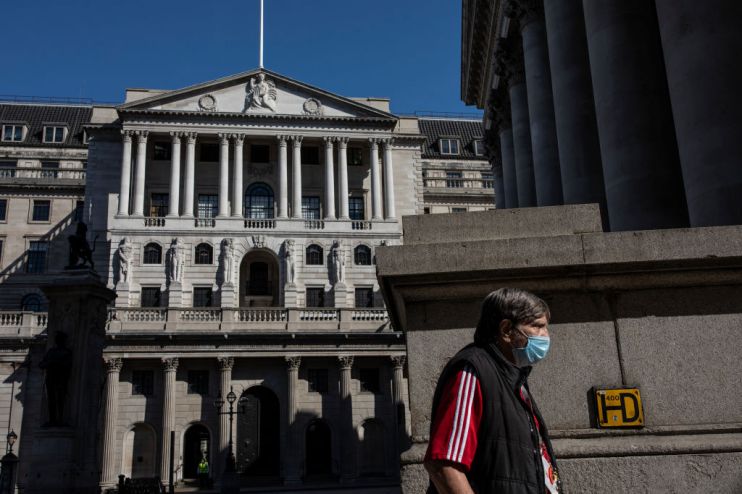Will the Bank of England change its tune on the UK economy?

The Bank of England will announce its latest monetary policy decision tomorrow, but investors and policymakers will be focused on whether Threadneedle Street has become more pessimistic about the UK economy.
Two months ago, the BoE’s monetary policy committee (MPC) raised some eyebrows when it said the UK economy would suffer an unprecedented crash but would bounce back quickly in what has been dubbed a ‘V-shaped’ recovery.
Since then, the economic data has in fact been a bit more positive than the Bank envisaged. But a quick rebound has been called into question by mounting job losses and rising coronavirus cases.
Investors will also keep a keen eye on what the Bank says about monetary policy. It is expected to leave rates on hold at 0.1 per cent and maintain its target of £745bn of bond-buying. But it could say something about negative interest rates, which it is weighing up for the first time.
Bank of England could lower growth forecasts
In May, the Bank did not release official forecasts but published a “plausible illustrative economic scenario”.
It said the UK economy would shrink by 14 per cent in 2020 in its worst year since the 1700s. The Bank foresaw a 25 per cent contraction in the second quarter.
However, GDP data has since beaten the Bank’s expectations. MPC member and chief economist Andy Haskel said an earlier easing of the lockdown was pointing to a less severe drop in the second quarter. That could lead the MPC to improve its growth forecast for 2020.
Yet the Bank said in May that the UK economy could well grow by an impressive 15 per cent in 2021. It said it would quickly regain its pre-coronavirus size.
Economists were sceptical at the time, and have become more so. “The better near-term outlook will be offset by a weaker medium-term picture,” said Sanjay Raja, economist at Deutsche Bank.

Raja pointed to three problems facing the UK economy. One is that “second waves [of coronavirus] have already infected a number of key UK trade partners”.
The second is that “business activity remains weak” three months on from April’s economic collapse. “Overall sales in the economy have only gradually picked up,” Raja said. “The number of businesses still trading remain low.”
The third – and arguably the most important – is that unemployment is set to climb and consumer confidence remain low as a result.
The job retention scheme that has supported more than 9m workers is set to end in October. “The reversal in fiscal stimulus will act as another dampener to growth at the end of the year,” Raja said.
Monetary policy set to remain on hold
Analysts expect the Bank to hold off from tinkering with monetary policy, which is currently ultra-loose. The Bank rate is set to stay at its current record low of 0.1 per cent. And planned asset purchases are expected to stay steady at £745bn.
Howard Archer, chief economic adviser to the EY Item Club said that it is “likely that the MPC will sit tight for the time being before providing further stimulus action”. He said the economy is currently benefiting from the recent easing of lockdown measures and tens of billions of pounds of fiscal stimulus from the chancellor.
Yet analysts are broadly expecting the Bank to increase stimulus towards the end of the year.
Anna Titareva, European economist at UBS, said: “An increase in job losses seems inevitable.” She added: “Voluntary social distancing… is also likely to weigh on consumption in sectors involving social interaction.”
She said the MPC might consider making the terms of its ultra-cheap lending to banks more generous in the autumn or winter “or increasing the pace or size of the asset purchases”.
Archer said he expected the Bank to announce more asset purchases worth £100bn “either at its September or – more likely – November meetings”.
Negative interest rates
Bank of England governor Andrew Bailey in May said negative interest rates were under “active review” for the first time.
It is currently reviewing the “effective lower bound” (ELB). That is the point at which an interest rate cut is no longer beneficial to the economy.
Raja said: “We think a decision on the ELB is near, and we should likely hear the outcome either at the August or September MPC meetings.”
“When the decision comes, our view is the MPC will buy itself more policy space and lower the ELB marginally into negative territory.” That does not necessarily mean the Bank would turn rates negative, however.
Analysts are divided on this issue. Titareva said: “We doubt that the MPC would choose to cut Bank Rate into negative territory before adopting other unconventional policies.”